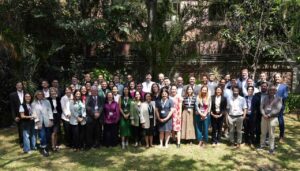The participants, consisting of researchers, policy-makers and practitioners, came together in Mexico City from 8 different countries across 5 continents to address pressing issues of digitalisation and sustainable development. The event highlighted key findings, policy recommendations and future collaborations.

The MGG/PRODIGEES Final Conference, from 09 to 12 March 2025, was the concluding event of Promoting Research on Digitalisation in Emerging Powers and Europe Towards Sustainable Development (PRODIGEES), a five-year project funded by the EU’s Horizon 2020 MSCA-RISE programme.
Embedded in the Managing Global Governance (MGG) network of IDOS and co-lead by IDOS and Instituto Mora (Mexico), the project facilitated comparative, transnational research on the intersection of digitalisation with governance, society, economy, and environment across Europe, Brazil, India, Indonesia, Mexico, and South Africa. The regions are facing distinct but interconnected challenges in balancing digital transformation with sustainable development.
The Final Conference provided a platform for participating researchers to present the project’s publications, policy recommendations, future action plans, and training initiatives. The event also engaged a wide range of stakeholders, including policymakers, academic institutions, civil society, and the general public to disseminate project results. Furthermore, a Memorandum of Understanding between IDOS and Instituto Mora was signed, following and sustaining the institutions’ joint leadership in the project and their collaboration in organising the conference. In their laudation, representatives from both institutions highlighted the importance of acting towards sustainability on the local, national, and international levels while countering prevailing inequalities.
The participants explored and shared what they had learned from their own work with the PRODIGEES project. A wide set of conference sessions covered topics like information governance, digitalisation in science, the public sector, urban planning, and finance, and the environmental impact of AI. Reflective exchanges between participants took place through a range of interactive formats. These included a world café, where everyone could speak from their own contextual perspectives; a bar camp, where participants got the chance to present their own ideas and formats, and a gallery walk, during which the attendees discussed their impressions of paintings that addressed questions of sustainability and digitalisation. These formats offered the opportunity to learn about each other’s work and share knowledge, so that participants could find many intersections and areas for potential collaborations.
On top of many substantive exchanges, the conference bore ample opportunities to share one’s personal experiences with PRODIGEES or its related MGG programme. Many of the conference participants had been PRODIGEES researchers and conducted field research with other participating institutions. These exchanges had taken place throughout a total of 74 research and innovation secondments. In addition, many other conference attendees had formerly participated in IDOS’ MGG Academy or knowledge cooperation and policy dialogue formats.
Accompanying this milestone event, IDOS researchers Benjamin Stewart, Matthias Kachelmann, and Dr Wulf Reiners embarked on a one-month secondment to Mexico, aligning their ongoing research with visits to network partners and conference preparations in close collaboration with Instituto Mora.
More information about the MGG/PRODIGEES Final Conference as well as the full conference report can be found here: MGG/PRODIGEES Final Conference „Digitalisation Towards Sustainable Development“ | MGG Network
Watch the conference video here.
Learn more about PRODIGEES here.
All PRODIGEES publications, presentations, and digital knowledge products are open access and available via the PRODIGEES Research Community on Zenodo

Schreibe einen Kommentar